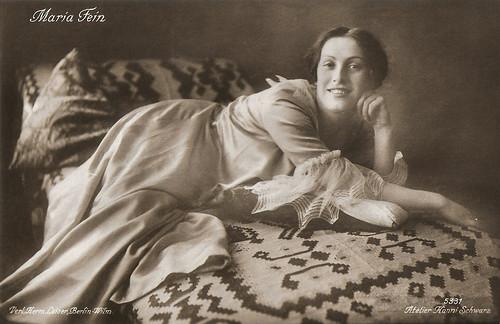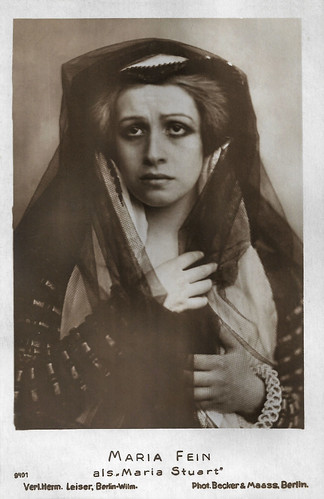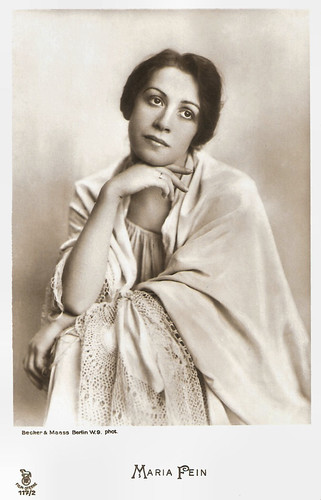
German postcard by Verlag Hermann Leiser, Berlin-Wilm., no. 5331. Photo: Atelier Hanni Schwarz.

German postcard by Verlag Hermann Leiser, Berlin-Wilm., no. 1859. Photo: Hugo Erfurth, Dresden.

German postcard by Verlag Hermann Leiser, Berlin-Wilm. no. 5173. Photo: Becker & Maass.

German postcard by Verlag Hermann Leiser, Berlin-Wilm., no. 9491. Photo: Becker & Maass, Berlin. Caption: Maria Fein as Maria Stuart. Maria Fein in the title role of Friedrich Schiller's 'Maria Stuart' (Mary Stuart) in a performance at the Deutsches Theater (German Theatre) in Berlin, 1915.
Pioneer film directors
Maria Arloisia Fein was born in 1892 in Vienna, Austria. Fein was born into a Jewish family that reportedly at some point converted to Catholicism. She was the daughter of Fanny Süssermann and Otto Fein, editor of the 'Neue Freie Presse', and an older sister of Franz Fein, an author, and translator of American novels.
Between 1909 and 1911, she was educated at the Universität für Musik und Darstellende Kunst Wien (Academy for Music and Performing Arts) in Vienna. She made her professional debut at the National Theatre Mannheim, where she rose to play the title role in Christian Friedrich Hebbel's tragedy, 'Judith'. Then she moved to the Royal Theater in Dresden, where she got some important theatre roles under the directorship of Walter Bruno Iltz.
Later she appeared in Berlin, where she was engaged by the famous theatrical producer and director Max Reinhardt at the Deutsches Theater (German Theatre). Under his direction, she played the title role in the Deutsches Theater's production of Friedrich Schiller's 'Maria Stuart' in October 1915. She continued in Berlin under Reinhardt’s direction in such parts as Ariel in William Shakespeare's 'The Tempest' at the Volksbühne, Elektra in Aeschylus 'The Oresteia', Regan in William Shakespeare's 'King Lear', both staged at the Großes Schauspielhaus and in 1919 returned to the Deutsches playing Rebekka in 'Jaákobs Traum' (Jacob's Dream) by Richard Beer-Hofmann.
Between 1916 and 1932 Fein appeared in at least twenty-three German films working with pioneer film directors Robert Wiene, Uwe Jens Krafft, Hanna Henning, Rochus Gliese, Friedrich Zelnik (Frederic Zelnik), Paul Leni, Rudolf Meinert, and Michael Kertesz (Michael Curtiz). In 1916 she began her film career at Messter Film in Der Mann im Spiegel/The Man in the Mirror (Conrad Wiene, Robert Wiene, 1916, released in 1917) opposite Bruno Decarli and Emil Rameau. With the same team, she also made Das Leben ein Traum/Life Is a Dream (Conrad Wiene, Robert Wiene, 1916) with Alexander Antalffy and Emil Jannings.
Over the following several years, Fein went on to appear in mostly melodramas and the occasional comedy. She was most productive in 1918-1919, with 8 to 6 films per year. These included many films with director Walter Schmidthässler, such as Sühne (1919) with Werner Krauss and the drama Maria Pavlowna (Emil Justitz, 1919) also starring Ernst Rückert and Ernst Stahl-Nachbaur. All these films were produced by the Bayerische Filmgesellschaft Fett & Wiesel. After 1919, Maria Fein's roles became scarcer, such as in Paul Leni's Die Verschwörung zu Genua/The Genoa Conspiracy (1921) with Hans Mierendorff, Erna Morena, and Fritz Kortner. Her final film and only sound film was Friederike/Frederica (Fritz Friedmann-Frederich. 1932) starring Mady Christians and based on Franz Lehár's operetta.

German postcard in the Film-Sterne series by Rotophot, no. 117/1. Photo: Becker & Maass, Berlin. Publicity still for the play 'Elga' (1896) by Gerhart Hauptmann.

German postcard in the Film Sterne series by Rotophot, no. 117/2. Photo: Becker & Maass, Berlin.

German postcard in the Film Sterne series by Rotophot, no. 117/4. Photo: Becker & Maass, Berlin.

German postcard in the Film-Sterne series by Rotophot, no. 211/3. Photo: Becker & Maass, Berlin / Bayern Films.
Max Reinhardt
The world of the theatre remained Maria Fein's main field of activity. But when the National Socialists came into power she wasn't given permission to play because of her Jewish extraction. She opened the restaurant 'Der grüne Zweig' with a friend during this time. Finally, she returned to Vienna and was able to continue her theatre career at the Volkstheater. She appeared as Gertrud in 'Hamlet' and as the czarina in 'Das Haus Romanoff'.
From 1936, she directed the Theater in der Josefstadt in Vienna together with Max Reinhardt. She also toured Europe and even the USA with her own acting group. Following the Nazi annexation of Austria in 1938, Fein fled to the Netherlands where she met director Ludwig Berger. Under the direction of Leopold Lindtberg, Fein appeared at the Schauspielhaus Zürich as Anisja in Leo Tolstoy's 'The Power of Darkness'.
When the war broke out, Maria Fein was at the Côte d'Azur in France. Thanks to the intervention of her daughter Maria Becker, who already lived in Switzerland, she could enter Switzerland in 1941 and found refuge there for the duration of the war. From there she emigrated to England and the USA where Fein continued to play theatre and organised readings. In 1951 she returned to Berlin to perform for the first time since the Nazi era. At the Schloss Charlottenburg she played Weisheit in Hugo von Hofmannsthal's 'Das Salzburger große Welttheater'.
Over the early 1950s, Fein toured England, France, and Switzerland giving recitations and lectures. On BBC Radio, she appeared in radio plays, including an English language adaptation of Bertolt Brecht's anti-war play, 'Mutter Courage und ihre Kinder' (Mother Courage and Her Children) in 1956. By 1961 she had returned to Switzerland, where she played the title role in G.B. Shaw's 'Mrs. Warren's Profession'. Maria Fein continued her stage career in Luzern. She directed some important productions, such as Jean Cocteau's 'La Machine infernale' (The Infernal Machine) at the Luzerner Festwochen and 'Elektra' by Jean Giraudoux with Maria Becker in the lead role. Fein remained active on stage until shortly before her death.
In 1964 she told of her experiences in Berlin theatres before 1933 in a twelve-episode documentary by the German network Norddeutscher Rundfunk. Maria Fein was married to fellow actor Theodor Becker, with whom she first acted together in the film Nur ein Modell/Just a Model (Georg Schubert, 1917), and with whom she had two daughters: Thea Becker and the actress Maria Becker. Fein's marriage to Becker ended in divorce in the mid-1930s after a long separation. Maria Fein passed away in 1965 at the home of Maria Becker in Zürich, Switzerland, at 73.

German postcard by NPG (Neue Photographische Gesellschaft), no. 343, Photo: Hanni Schwarz, Berlin.

German postcard by N.P.G., no. 1222. Photo: Anny Eberth, Berlin.

German postcard by Photochemie, no. K.231. Photo: Alex Binder, Berlin.

German postcard by Verlag Hermann Wolff. Photo: Alex Binder, Berlin.
Sources: Wikipedia (German and English), and IMDb.
This post was last updated on 5 March 2024.
No comments:
Post a Comment